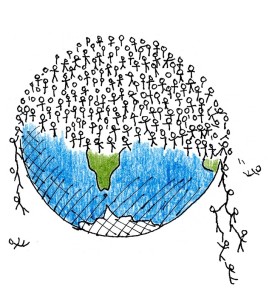A Person’s A Person, No Matter How Small
Posted: 3 March 2016
 My wife Jane and I have two little girls, Clare and Louise; Clare turns two this month and Louise is just over six months old. Clare is at a really fun – but albeit all consuming – stage. She loves nothing more than playing outside, and if she is not insisting on being pushed around in her plastic toy car, she is carefully dropping her toys in the wading pool, before picking them out of the water and starting all over again. Louise is beginning to shuffle around on the lounge room floor while learning about the world through studying a range of stuffed animals. Clare will now regularly come and lay down next to Louise on the floor and with an enthusiastic ‘hello’ proceed to take back those stuffed animals which she believes are her own. Everyday our daughters are growing and developing but they really are still just babies. They rely on us for everything, we are their nurturers and their protectors, their friends and their family. Their world is safe and secure because we make it that way for them.
My wife Jane and I have two little girls, Clare and Louise; Clare turns two this month and Louise is just over six months old. Clare is at a really fun – but albeit all consuming – stage. She loves nothing more than playing outside, and if she is not insisting on being pushed around in her plastic toy car, she is carefully dropping her toys in the wading pool, before picking them out of the water and starting all over again. Louise is beginning to shuffle around on the lounge room floor while learning about the world through studying a range of stuffed animals. Clare will now regularly come and lay down next to Louise on the floor and with an enthusiastic ‘hello’ proceed to take back those stuffed animals which she believes are her own. Everyday our daughters are growing and developing but they really are still just babies. They rely on us for everything, we are their nurturers and their protectors, their friends and their family. Their world is safe and secure because we make it that way for them.
But what if one afternoon in the middle of Clare playing outside I just walked away, leaving her in the backyard by herself with no food, no protection and no shelter. Her smile would fall and the frown would descend into tears, she would cry her eyes out, her nose would run and she would go to the back door yelling ‘mummy’, ‘daddy’, not understanding what had just happened. As night began to fall she would cry and cry, tears streaming down her face. She would be hungry and want her milk. She is not old enough to reason out her situation and create or find shelter in the yard. I really don’t know, or do I want to know, how she would cope. Would she even make it through the night?








